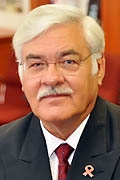Latest News Archive
Please select Category, Year, and then Month to display items
10 March 2022
|
Story Anthony Mthembu
|
Photo Unsplash
 The No Student Hungry team gearing up to start distributing food parcels to the selected students.
The No Student Hungry team gearing up to start distributing food parcels to the selected students.
The UFS is one of the many institutions of higher learning where food insecurity is an active issue. However, the
No Student Hungry Programme is one of the initiatives launched at the university to assist in fighting food insecurity at the institution.
The purpose of the programme
Since its inception in 2011, the initiative has assisted many students in acquiring a healthy meal. Additionally, the Food Environment Office also hands out food packages, so that students can continue to achieve academically. “We are trying to develop a healthy environment for students and make it easier for them to have a nice and healthy meal,” stated Annelize Visagie, who heads the Food Environment Office at the UFS. The Food Environment programme is spread out on all three campuses, each with its own facilitators. Furthermore, the programme mainly caters for students who are not funded by the National Student Financial Aid Scheme (NSFAS) but who are excelling academically. The abovementioned students apply for assistance online, and a list is then drawn up of students who receive assistance for the year.
Alternative solutions to keep the initiative running
On the Bloemfontein Campus, the No Student Hungry Programme will be catering for 200 students in the 2022 academic year, assisting them with a daily nutritious meal. Additional food parcels are also handed out to provide further assistance. “We give food parcels to the students on the list every Tuesday and Thursday at the Thakaneng Bridge,” Visagie highlighted. However, she argues that catering for the student population through this programme can be a challenge, as the demand for assistance is growing rapidly and the ability to assist is limited. The programme relies on partnerships and sponsors to assist the student body. In fact, the coordinators of the programme currently have a memorandum of understanding with Tiger Brands according to which they deliver around 100 food parcels for distribution.
In addition, the coordinators have put in place alternative measures to ensure that they can provide more food to students. “The
Kovsie Act Office, in partnership with the
Department of Sustainable Food Systems and Development, has started a food garden where healthy and nutritious produce are grown, in order to add value to the distribution,” she indicated. Although the programme can only assist to a point, students who are in desperate need of assistance are never turned away. In fact, the
Social Support Unit at Thakaneng Bridge usually assists students with food vouchers for a maximum of four days.
A commitment to teaching healthy eating habits
The programme is not only committed to curbing food insecurity, but also to ensuring that students have a healthy and balanced diet. As such, a booklet is being issued by the
Department of Nutrition and Dietetics in collaboration with the Department of Sustainable Food Systems and Development, which contains ways in which students can make a healthy meal using some of the ingredients offered in the food parcels.
“We want to teach students how to eat healthy in the cheapest way, because they don’t have a lot of money to buy expensive food products,” Visagie argued.
UFS academic joins an elite league of achievers
2010-04-14
 |
| Prof. Dingie van Rensburg |
|
Prof. Dingie van Rensburg, Director of the Centre for Health Systems Research & Development at the University of the Free State (UFS), has joined an elite list of a only few distinguished individuals who have been awarded honorary doctorates by the University of Antwerp (UA) in Belgium.
He is only the third South African to be honoured in this way by the UA, following in the footsteps of Constitutional Court Judge Albie Sachs (2000) and former State President, Nelson Mandela (2004).
He is the first social scientist from South Africa to receive this honorary doctorate from the UA – the highest academic distinction of that university. The university has previously only awarded three honorary doctorates to social scientists: Prof. Raymond Boudon, sociologist at the University of Paris-Sorbonne (1995); Prof. Robert Putman, political scientist at Harvard University (2000); and Prof. John Nash (of A Beautiful Mind fame), mathematician and economist at Massachusetts Institute of Technology (MIT) and Princeton.
The award ceremony will take place on 29 April 2010 in Antwerp.
Prof. Van Rensburg has authored, co-authored and was editor of many books/volumes, chapters in books, monographs, research reports and articles in scientific journals. He has also presented and co-presented at numerous national and international conferences; and supervised a significant number of master’s, doctoral and post-doctoral students.
In his 17 years as director of the Centre he has initiated, managed and led approximately 50 research and development projects, several of them large and long-term projects, and many of an inter-institutional and multidisciplinary nature.
In 2002 he became an NRF-rated researcher and in 2007 his rating as an established researcher was renewed. In the past two decades he received several research grants simultaneously from both the National Research Foundation and the Medical Research Foundation of South Africa, mostly for projects on Tuberculosis, HIV/Aids and antiretroviral treatment.
Prof Van Rensburg holds membership of both the Suid-Afrikaanse Akademie vir Wetenskap en Kuns and the Academy for Science of South Africa; he also served for varying periods on the Councils of both these academies. He was also a member of various health bodies of the Free State Province and the National Science and Technology Forum.
Media Release
Issued by: Mangaliso Radebe
Assistant Director: Media Liaison
Tel: 051 401 2828
Cell: 078 460 3320
E-mail: radebemt@ufs.ac.za
14 April 2010
|